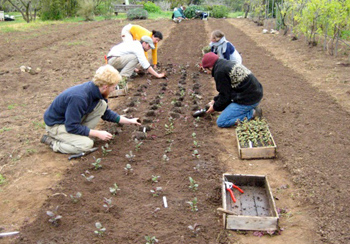Campus News
UCSC moves forward with ecological horticulture apprenticeship program
The pioneering Apprenticeship in Ecological Horticulture program at the UC Santa Cruz Farm and Garden will continue to offer hands-on training in small-scale organic agriculture despite a significant loss of state and federal funding to the Center for Agroecology and Sustainable Food Systems (CASFS).


The pioneering Apprenticeship in Ecological Horticulture program at the UC Santa Cruz Farm and Garden will continue to offer hands-on training in small-scale organic agriculture despite a significant loss of state and federal funding to the Center for Agroecology and Sustainable Food Systems (CASFS).
CASFS, the first and most diverse program in sustainable food systems in the nation, has lost more than 50 percent of its state funding since 2008. Further, federal budget cuts have meant the elimination of an annual $335,000 U.S. Department of Agriculture grant.
Consequently, student fees for the six-month apprenticeship program that includes full-time instruction and housing will rise from $5,300 to $8,500 beginning with the April 2012 session. Fees will increase to $12,800 for the session beginning in April 2013.
“The apprenticeship program is an important part of CASFS and has graduated more than 1,400 students who practice, promote, and teach sustainable agriculture around the world,” said Social Sciences Dean Sheldon Kamieniecki who oversees CASFS. “It is a wonderful asset. Raising the fees is an extremely difficult but necessary condition to ensure that it can continue and thrive.”
Kamieniecki explained that CASFS is on sound financial footing this year but faces a substantial deficit in the 2012-2013 academic year because of state and federal budget cuts. “The fees must increase or all of CASFS would be in jeopardy,” he said.
Since its founding in the 1990s, through research, education, and public service, CASFS has illuminated and worked to resolve the key social and environmental challenges throughout the food system. Today, CASFS is internationally renowned for its path-breaking academic and applied work.
“The Apprenticeship is a core program of CASFS, and one through which students are making an enormous difference,” CASFS Director Patricia Allen said. “There has never been greater interest and greater need for research and education in sustainable food systems. We must work together to envision and create a food system that ensures access to healthy food and conserves the environmental resources upon which agriculture depends.”
The Apprenticeship in Ecological Horticulture offers a unique blend of classroom and hands-on training on a 25-acre farm and three-acre garden. Students receive intensive training in organic soil management, crop planning, greenhouse skills, orchard care, pest and disease control, and small-scale marketing to provide them with a mastery of basic practical skills and concepts necessary for the sound management of organic gardens and small-scale farms. It is a full-time course with approximately 300 hours of formal instruction and 700 hours of in-field training and work experience.
Each year nearly 150 prospective apprentices apply for approximately 36 openings. “Our goal is to raise scholarship funds so that this excellent program is accessible to people of all socioeconomic backgrounds,” Allen said. “This is a time to increase participation in creating the food systems of the future.”
Graduates receive a certificate in Ecological Horticulture from UC Santa Cruz Extension.
Since 1967, more than 1,400 graduates have gone on to apply their training around the world, developing their own commercial farms, market gardens, and Community Supported Agriculture (CSA) projects, starting inner-city community gardens, working as environmental educators, participating in international rural development projects, managing organic landscaping businesses, and pursuing degrees in agricultural studies.
CASFS has established a goal to provide scholarships for at least 20 students annually as well as provide a fund to help students purchase required tools and books. Information on donating to the Apprentice Scholarship Program is available from Marcus Frost, assistant director of development, at jmfrost@ucsc.edu or 831-502-7274.